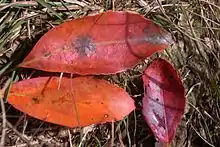Elaeocarpus costatus
Elaeocarpus costatus is a flowering plant in the Elaeocarpaceae family. The specific epithet derives from the presence of ribs (Latin: costae) on the endocarp of the fruit.[1]
| Elaeocarpus costatus | |
|---|---|
 | |
| Senescent leaves | |
| Scientific classification | |
| Kingdom: | Plantae |
| Clade: | Tracheophytes |
| Clade: | Angiosperms |
| Clade: | Eudicots |
| Clade: | Rosids |
| Order: | Oxalidales |
| Family: | Elaeocarpaceae |
| Genus: | Elaeocarpus |
| Species: | E. costatus |
| Binomial name | |
| Elaeocarpus costatus M.Taylor (1939)[1] | |
Description
It is a tree growing to 8 m in height. Its leaves are 6–9 cm long, 2.5–3 cm wide. The axillary inflorescence is some 3 cm long, bearing 8–10 pendant white flowers. The fruit is an ovoid drupe, 2 cm long and blue when ripe. The tree is often recognised in the forest by an occasional bright red leaf.[1]
Distribution and habitat
The tree is endemic to Australia’s subtropical Lord Howe Island in the Tasman Sea, where it is rare. It is found at all elevations on and around Mounts Lidgbird and Gower at the southern end of the island.[1]
References
- " Elaeocarpus costatus ". Flora of Australia Online: Data derived from Flora of Australia Volume 49 (1994). Australian Biological Resources Study (ABRS). Retrieved 5 February 2014.
This article is issued from Wikipedia. The text is licensed under Creative Commons - Attribution - Sharealike. Additional terms may apply for the media files.